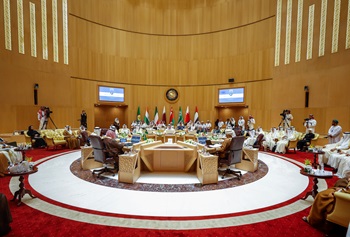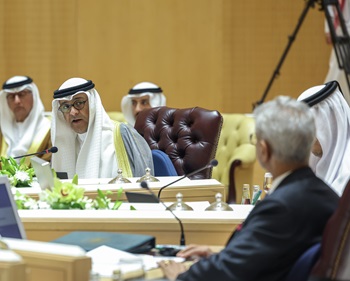General Secretariat - Riyadh
His Excellency Mr Jasem Mohamed Albudaiwi, Secretary General of the Gulf Cooperation Council (GCC), confirmed that the convening of the first ministerial meeting of the strategic dialogue between the GCC and the Republic of India reflects the sincere and mutual desire to enhance and develop relations in a way that serves the interests of our peoples and reinforces stability and prosperity in the region.
HE the Secretary General’s statement came during the first joint ministerial meeting of the strategic dialogue between the GCC and the Republic of India, held on Monday (September 9, 2024), chaired by His Excellency Shaikh Mohammed bin Abdulrahman Al Thani, Prime Minister and Minister of Foreign Affairs of the State of Qatar, current President of the Ministerial Council, with the participation of Their Highnesses and Excellencies the Ministers of Foreign Affairs of the GCC countries, and in the presence of His Excellency Mr Subrahmanyam Jaishankar, the Minister of External Affairs of the Republic of India.
In his speech during the meeting, HE the Secretary General stated that the relations between the GCC countries and the Republic of India are historical and deep-rooted, extending over several centuries and built on foundations of mutual trust and fruitful cooperation, stating that these relations continuously witness significant developments, reflecting the strong will of both parties to enhance the partnership in various fields.
In this context, His Excellency pointed to the areas of cooperation mentioned in the Memorandum of Understanding signed by both parties in 2022, which constitute the main starting point for cooperation between the two sides. He further emphasised that political dialogue and cooperation between the GCC countries and India are fundamental pillars in the strength of the relations, whether at the bilateral or joint level. He also mentioned that the political challenges facing our region and the world require continuous coordination and constructive dialogue to enhance security and stability, and that previous experiences have demonstrated that our close cooperation has greatly contributed to tackling several crises and political challenges.
Moreover, HE Mr Albudaiwi said that the political and security challenges facing the world, such as terrorism and extremism, regional conflicts and humanitarian crises, necessitate more cooperation and coordination between the GCC countries and India. He stated that we can work together effectively to confront these challenges, stressing that unifying efforts and stances in international forums will enhance our ability to influence and contribute to achieving peace and security. His Excellency also underlined that security cooperation is not limited to addressing challenges alone but also extends to promoting peace and security in our region and the world, explaining that through information exchange and security coordination, we can work to prevent crises and conflicts before they occur, and we can also cooperate on regional and international peace and security initiatives, contributing to creating a stable and secure environment for our peoples.
Elaborating further in his speech, HE the Secretary General pointed to the effective mechanisms for political dialogue and continuous consultation between the GCC countries and India, underlining that these tools provide us with numerous opportunities to exchange views and build common understandings that contribute to enhancing security and stability, as well as strengthening bilateral relations, as they enable us to hold periodic meetings at the level of ministers and senior officials to discuss important political issues and shared challenges and to devise strategies to address them.
HE the Secretary General emphasised that economic cooperation represents an important focus in our bilateral relationship, forming the foundation for our trade and investment relations, citing that the volume of trade exchange between the GCC countries and India reached approximately USD 174 billion in 2022, accounting for about 11% of the total trade volume of the GCC.
He remarked that this reflects the significant importance of this cooperation, as the trade cooperation includes GCC exports valued at around USD 91 billion, while imports amounted to USD 83 billion, enhancing the economic integration between us and providing opportunities for growth and market expansion. Furthermore, His Excellency noted that the investments of GCC countries in India reached approximately USD 6 billion in various projects, reflecting mutual trust and promising opportunities offered by the markets on both sides.
“By enhancing joint investments, we can achieve significant economic benefits, including job creation and economic growth. In addition, there are substantial joint investment opportunities in renewable energy sectors, contributing to sustainability and diversifying sources of energy while protecting the environment,” he said.
During his speech, His Excellency affirmed that cooperation in technology and innovation is another important focus in our relations, noting that the exchange of expertise in advanced technologies and scientific research can significantly contribute to advancing development on both sides, as we foresee immense potential for collaboration in areas such as artificial intelligence, big data, and financial technology. He stressed that this will enhance our capacity for innovation and achieve sustainable growth, while infrastructure is another area of great importance in strengthening our cooperation, particularly as investing in infrastructure projects, such as roads, bridges, airports, and ports, can enhance connectivity between our countries and achieve economic integration, adding that we can benefit from Indian expertise in this area to develop infrastructure in the GCC, thereby enhancing our economic capabilities and providing new opportunities for growth and development.
His Excellency further said: “The rich cultural heritage of both sides is an essential factor in promoting mutual understanding and rapprochement between our peoples. Cultural cooperation can help build bridges of communication and understanding among peoples, strengthening bilateral relations at the popular level and reflecting the common values that connect us. It also contributes to the exchange of academic expertise to enhance cultural and scientific ties between us through cultural and academic exchange programmes, enabling us to promote mutual understanding and share knowledge and experiences between our peoples.”
Emphasising the significance of this aspect, HE the Secretary General underscored that cooperation in academic and scientific fields represents an important aspect of our cultural collaboration, allowing universities and academic institutions in the GCC and India to cooperate in scientific research and development, and to contribute to achieving tangible collaboration in technology and sciences while increasing the pace of sharing expertise and knowledge and enhancing research capabilities on both sides.
He also said that both sides have agreed on a Joint Action Plan for the upcoming period (2024-2028), with the aim of setting specific programmes for advancing cooperation in these fields, expressing his aspiration that it would be approved in today's meeting. “The General Secretariat has also been tasked with coordinating between the Republic of India and the GCC to begin implementing this plan at the earliest possible opportunity and to develop and enhance it as deemed appropriate by both sides, making it a contributor to the robust relations between them,” His Excellency clarified.
In conclusion, His Excellency said today's meeting will contribute to strengthening the ties between us and opening new horizons for joint cooperation, as we stand before a great opportunity to enhance collaboration in the various areas addressed in the Memorandum of Understanding and to implement the Joint Action Plan that has been reached between the GCC and the Republic of India for the period (2024-2028).

